“What territory can accommodate more than one king? I do not speak…of the struggle between white rose and red, nor of that other struggle, years before, between Hector and Achilles, but between Belgium and the Congo, between Leopold and the lion. Leopold raised his rifle, and thenceforth but one king reigned.” – a “poem” written by Capt. Lalande Biran, Yangambi station.
 When young Chrysostome Liege arrives by boat to begin his service in the Belgian Force Publique for King Leopold II in the Congo, he is clearly an innocent – a shy, religious, and humorless young man thrust into circumstances which challenge everything he, and the reader, consider “civilized.” It is 1903, and the Congo is King Leopold’s private fiefdom. Though the country has been called the Congo “Free State” since 1885, King Leopold has been the sole shareholder of this “non-governmental organization” which he founded so he could be a “benevolent ruler” to an area in central Africa more than twice the size of New England and New York combined. In reality, “freedom” and “benevolence” have never been part of the King’s plan. He has, from the beginning, used the Congo for his own purposes, forcing an unwilling native population to supply huge amounts of ivory, mahogany, minerals, and rubber which would benefit only him. Failure to meet nearly impossible quotas has resulted in the loss of a hand for the unfortunate laborer.
When young Chrysostome Liege arrives by boat to begin his service in the Belgian Force Publique for King Leopold II in the Congo, he is clearly an innocent – a shy, religious, and humorless young man thrust into circumstances which challenge everything he, and the reader, consider “civilized.” It is 1903, and the Congo is King Leopold’s private fiefdom. Though the country has been called the Congo “Free State” since 1885, King Leopold has been the sole shareholder of this “non-governmental organization” which he founded so he could be a “benevolent ruler” to an area in central Africa more than twice the size of New England and New York combined. In reality, “freedom” and “benevolence” have never been part of the King’s plan. He has, from the beginning, used the Congo for his own purposes, forcing an unwilling native population to supply huge amounts of ivory, mahogany, minerals, and rubber which would benefit only him. Failure to meet nearly impossible quotas has resulted in the loss of a hand for the unfortunate laborer.
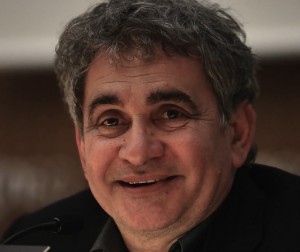
For the soldiers in the Force Publique, especially those assigned to remote areas like Yangambi, where Chrysostome will be working, an outside social milieu does not exist – there is only the jungle. The soldiers obey the obvious protocols of the military, but there are only seventeen Belgian officers at the garrison, and with no active rebellion by native groups to keep them occupied, at the moment, they have significant amounts of time on their hands. Might makes right here, and once they have performed their assigned duties, they enter a world completely different from anything any of them have ever known.
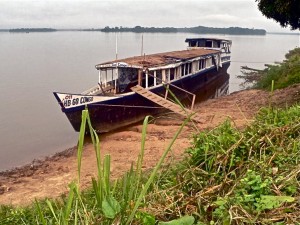
Yangambi
Author Bernardo Atxaga, whose previous works have been set in his native Basque country in Spain, provides only basic information about the rule of King Leopold II and Belgium’s Force Publique, spending little time on the grand scale of the atrocities this group has committed historically against the native population. Instead, he focuses on the behavior of the individual officers of this one small garrison in Yangambi as they conduct their daily lives. This creates a unique narrative in which the author explores what happens when there are, essentially, no limits on what individuals may do to keep themselves entertained – life is truly a “jungle.” By creating in Chrysostrome a man who is both naïve and timid – and regarded as a “poufter” by his fellow officers – Atxaga also creates scenes in which Chrysostrome’s reactions set the behaviors of the others into sharp relief. Chrysostrome has no sense of being part of the group and, more importantly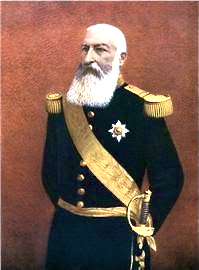 , no apparent need to be part of it, and since he also has no feeling for irony or absurdity, even in circumstances in which the ironies and absurdities are patently obvious, the reader is alternately horrified by some of the officers’ activities and somewhat nonplussed by Chrysostrome’s apparent attitude of being above it all. All of the men except Chrysostrome drink in the Club Royale, which they have built, and all of them except Chrysostrome also gamble. As one of the officers notes, “I’ve no idea whether he’ll be a good soldier or a bad one, but he’ll certainly be a miserable one. As miserable as a mandrill.”
, no apparent need to be part of it, and since he also has no feeling for irony or absurdity, even in circumstances in which the ironies and absurdities are patently obvious, the reader is alternately horrified by some of the officers’ activities and somewhat nonplussed by Chrysostrome’s apparent attitude of being above it all. All of the men except Chrysostrome drink in the Club Royale, which they have built, and all of them except Chrysostrome also gamble. As one of the officers notes, “I’ve no idea whether he’ll be a good soldier or a bad one, but he’ll certainly be a miserable one. As miserable as a mandrill.”
In charge of this garrison is Captain Lalande Biran, a “poet” who has been away from home for six years. Biran regularly sends large sums of money home to his wife, Christine Saliat de Meilhan, whose goal is to own seven houses in France by the end of seven years. She already owns six. Actively engaged in smuggling ivory and mahogany with a Monsieur X back in Belgium, and with Lt. Richard Van Thiegel at the garrison, Biran is flabbergasted to discover that the prices of mahogany and ivory have suddenly tripled since the last shipment. With just two more large shipments, both men will be able to resign from the Force Publique by the end of another year, as long as they do not get caught exporting the riches which officially belong to the King.
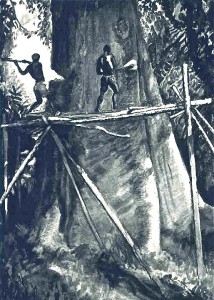
Felling Mahogany
When the King plans a visit, bringing a famous dancer from Philadelphia, whom he plans to make Queen of the Congo, all garrison activity is organized to promote this. Henry Morton Stanley will accompany the King and will attend the coronation of the new Queen beside Stanley Falls. According to Van Thiegel, “There’s never been another lover like Leopold II, and it will be years before anyone breaks his record…Beside him, I’m a mere babe.” Later the garrison learns that the King will be sending a statue of the Virgin, created by the “new Michelangelo,” to be installed permanently beside Stanley Falls as “The Virgin of the Congo.” No one finds this ironic.
The soldiers of Yangambi spend most of their free time chasing local women. Van Thiegel, sometimes referred to as “the Drunken Monkey,” finds satisfaction with the local women, while Biran, fearing that he might get syphilis, has his orderly bring him a virgin once a week. The young girl is examined, sometimes publicly, by his orderly to ascertain that she is, in fact, a virgin, though Biran and Van Thiegel also believe it might be fun to require Chrysostrome to perform this task since he seems to have little interest in women. The officers suspect he is gay, and to them “the only contest that mattered [was] the virility stakes.” The self-described “virility stakes” continue among the officers as time and the jungle work their wiles.
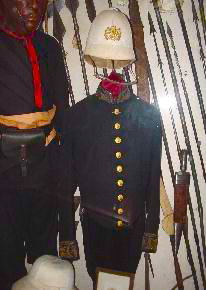
Officer’s uniform, Force Publique
Atxaga’s sense of narrative flow reflects his experience with the much longer novels he has written in Basque, and the novel moves quickly, enhanced by intriguing and vibrant details about the time, place, and main characters. Much credit is owed to prize-winning translator Margaret Jull Costa, whose work translating the Spanish text into English is flawless, her ear for dialogue, particularly fine. Though this novel is, in a sense, a kind of morality tale, the author conveys his themes without didacticism, focusing on ordinary characters facing crises, often of their own making. The facts speak for themselves here, and Atxaga lets them.
ALSO by Bernardo Atxaga: THE ACCORDIONIST’S SON and OBABAKOAK
Photos, in order: The author’s photo appears on http://www.diariodenavarra.es
A boat pulls up to shore in Yangambi, along the Congo: http://www.gocongo.com
The infamous King Leopold II, from http://madmonarchist.blogspot.com
The navy blue uniform worn by the officers of the Force Publique may be seen on
http://www.rudi-geudens.be
G. Spencer-Prise’s watercolor of the Felling of a Mahogany Tree may be found here:http://usslave.blogspot.com
ARC: Graywolf
